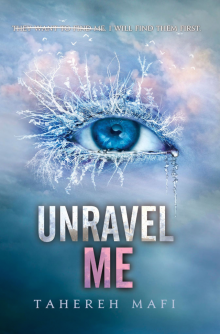- Home
- Tahereh Mafi
This Woven Kingdom Page 12
This Woven Kingdom Read online
Page 12
Kamran drew a sharp breath.
The teacup slipped from his finger, shattering as it hit the ground.
These were preparations for a ball.
Kamran couldn’t believe it. His grandfather had said he might wait at least a week before confirming the date, but this—this meant the king had made the decision without him.
For him.
Kamran’s heart seemed to beat in his throat. He knew what this meant. He knew it to be an intentional unkindness. It was subterfuge glossed over with the shellac of benevolence. His grandfather wasn’t willing to wait a moment longer, instead forcing him, now, to choose a bride.
Why?
The question pounded over and over in his head, steady as a heartbeat, as he all but ran to the king’s chambers.
Kamran wasted no time upon arrival.
He pounded on his grandfather’s door in as polite a manner as he could manage, stepping back when it swung open, ignoring the servant who addressed him. He pushed forward into the room, his earlier arguments in favor of the girl’s life all but forgotten in the wake of this—this—
He turned the corner and discovered the king in his dressing room.
Kamran came to a sudden halt, his chest heaving with barely suppressed frustration. He bowed before the king, who bade him rise with a gesture of his hand.
Kamran stood, then stepped back.
It would not do to speak on the subject until the king was fully dressed, and besides, his grandfather’s valet—a man named Risq—was still in the room, assisting the king with his long velvet robes. Today King Zaal wore a scarlet set with fringed epaulets; Risq buttoned the golden center strip that was the placket, then draped a pleated blue sash across the king’s chest. This, he anchored with a heavy, intricately designed pearl belt, which he secured at the center with a single medallion: an eight-pointed star.
Dressing the king took an agonizingly long time.
There were endless layers, an infinite number of details. Kamran himself was expected to undergo a great deal of fanfare in his dress, but as he was seldom seen or required in public, he was more often spared the pomp and ceremony. Watching the king now, Kamran realized with a creeping dread that he would one day be expected to perform every tedious practice his grandfather undertook.
He clenched, unclenched his fists.
Only once every military badge and royal insignia was secured—the miniature of King Zaal’s late wife, Elaheh, was pinned in a position of prominence over his heart—and his pearl harnesses were crisscrossed over his chest, did the king ask his man to leave them. His grandfather’s ornate crown—so heavy it could be used to bludgeon a man—he held in his arms.
Kamran stepped forward, hardly parting his lips to speak, when his grandfather lifted a hand.
“Yes,” he said. “I know you’ve come to change my mind.”
Kamran stiffened.
For a moment, he wasn’t sure to which problem the king was referring. “Yes, Your Majesty,” he said carefully. “Indeed, I’ve come to try.”
“Then I will be sorry to disappoint you. My position on the matter is resolute. The girl is a threat; such a threat must be removed immediately.”
The impending ball was at once forgotten.
Kamran only stared, for a moment, at the face of his grandfather: his clear brown eyes, his rosy skin, his shock of white hair, white beard, white eyelashes. This was a man he loved; one he dearly respected. Kamran had admired King Zaal his entire life, had seen him always as a paragon of justice and greatness. He wanted, with his entire soul, to agree with the king—to stand always beside this extraordinary man—but for the first time, Kamran struggled.
For the first time, he doubted.
“Your Majesty,” Kamran said quietly. “The girl has committed no crime. She’s done nothing to threaten the empire.”
King Zaal laughed, his eyes widening in amusement. “Done nothing to threaten the empire? She is the sole surviving heir to an ancient kingdom—on our own land—and not a threat to our empire? She is the very definition.”
Kamran froze. “She—what?”
“I see you’ve not figured it out, then.” Zaal lost his smile by inches. “She is not a mere servant girl.”
Kamran felt a bit like he’d been impaled on a dull blade. He’d known there was something unusual about the girl, but this—
“How can you know for certain who she is?”
“You forget, child, that I have been searching for precisely such a creature since the day I became king. In fact I’d thought for certain I’d found her once; I assumed her dead some years ago. That she was alive was a surprise to me, but if there is ice in her veins, there can be no doubt.”
The prince frowned. This was too much to process. “You say she is the sole surviving heir to an ancient kingdom. But wouldn’t that make her—”
“Yes,” said his grandfather. “Yes. She is, among her people, considered a queen.”
Kamran took a sharp breath. “Why have you never told me about this? That there are other kingdoms in Ardunia?”
Zaal touched two fingers to his temple; he looked suddenly tired. “They died out thousands of years ago. They are not like us, Kamran; they do not pass down their line through their children. They claim their sovereigns are chosen by the earth, marked by the infinite cold they were once forced to endure. It is said that the ice chooses only the strongest among them, for there are very few who can survive the brutality of the frost inside the body.” A pause. “Surely you must see that she is not some ordinary girl.”
“And yet— Forgive me, but she seems wholly unaware of who she is. She lives a life of the lowest status, spends her days doing backbreaking labor. Do you not think—”
“That she might be ignorant of her own self? Of what she might be capable?”
“I do think it’s possible, yes, that she doesn’t know. She appears to have no family—perhaps no one has told her—”
King Zaal laughed again, though sadly this time. “Ice runs through the girl’s veins,” he said, shaking his head. “Ice so rare it is revered, even as it damages the body. That kind of power leaves its marks, child. The girl no doubt carries the proof of her identity on her own flesh—”
“Your Majesty—”
“But yes, yes, let us pretend. For your sake let us pretend and say you are right, that she does not know who she is. What then?” The king steepled his hands under his chin. “If you do not think there are others searching for her right now, you are not paying close enough attention. Pockets of unrest in the Jinn communities continue to disturb our empire. There are many among them deluded enough to think the resurrection of an old world is the only way to move forward.”
Kamran’s jaw tensed. He did not appreciate the condescension in his grandfather’s tone. “Indeed I am well aware,” he said flatly. “I would humbly remind my grandfather that I was away from home for over a year, overseeing our armies, witnessing such accounts firsthand. It is not the threat I misunderstand, Your Highness, but the tactic. To take a preemptive strike against an innocent young woman— Would it not be worse? What if our actions against her were discovered? Would that not result in greater chaos?”
For a moment, King Zaal was silent.
“It is indeed a risk,” he said finally. “But one that has been thoroughly considered. If the girl were to claim her place as the queen of her people, it is possible, even with the brace of the Fire Accords, that an entire race would pledge their allegiance to her on the basis of an ancient loyalty alone. The Accords would be forgotten in the time it took to light a torch. The Jinn of Ardunia would form an army; the remaining civilians would riot. An uprising would wreak havoc across the land. Peace and security would be demolished for months—years, even—in the pursuit of an impossible dream.”
Kamran felt himself growing irritated and forced himself to remain calm. “With all due respect, Your Majesty, if we can imagine our Accords so easily broken, should we not be compelled to wonder what mak
es them brittle? If the Jinn among us would move so easily to revolt—to pledge allegiance to another—should we not first consider addressing the dissatisfaction that might move them to revolution? Perhaps if they felt more reason to be loyal to us, they would not—”
“Your idealism,” King Zaal said sharply, “is romantic. Diplomatic. And unrealistic. Can you not see my motivation for the establishment of the Accords? The entire reason I so desperately sought the unification of the races was to get ahead of the prophecy, to suture together the two groups so the Jinn could not be so easily claimed by a new sovereign—”
“My apologies,” Kamran bit out angrily. “I thought you established the Accords to bring peace to our empire, to finally end the unnecessary bloodshed—”
“And that is precisely what I did,” King Zaal thundered, more than matching his grandson’s tone. “Your own eyes cannot deny it. You have seen since the day you were born that my every effort has been in the service of our people. With my very life I’ve tried always to prevent war. To circumvent tragedy. To protect our legacy.
“One day, Kamran, I’ve no doubt you will be a great king. Until then there is much you do not see, and a great deal more you must try to anticipate. Tell me: can you imagine such a revolt finding success?”
“Does it matter?” the prince nearly shouted.
King Zaal raised his chin, drew a sharp breath.
“Forgive me.” Kamran lowered his eyes and collected himself. “But does it matter whether they are capable of success? Is there not a greater danger, Your Highness, in demanding obedience from unwilling subjects? And should any sovereign be satisfied with the tenuous allegiance of a people merely biding their time, waiting for the right moment to unleash their anger—to revolt? Would it not be wiser to allow such a people a voice now—to cool their anger now—in the interest of preventing an eruption later?”
“You are quite good,” his grandfather said coldly, “at taking clear and logical arguments and elevating them to a level so esoteric they are rendered ineffectual.
“Your reasoning, while admirably impassioned, will not weather the storms of the real world. This is not about rights, child, but reason. It is about preventing the kind of bloodshed so horrific it would keep a man from ever again closing his eyes. What astounds me most is that you, the impending heir to this throne, would even consider allowing the birth of another monarchy on your own land.” His grandfather hesitated a moment, studied Kamran’s face. “You’ve met this girl, I take it? Spoken with her?”
Kamran tensed; a muscle jumped in his jaw.
“Yes,” said the king. “As I thought.”
“I do not know her, Your Majesty. Only of her, and from afar. My arguments are not influenced b—”
“You are young,” said his grandfather. “As such, you are well within your rights to be foolish. Indeed it is natural at your age to make mistakes, to fall for a pretty face and pay dearly for your folly. But this— Kamran, this would not be foolish. This would not be folly. This would be a travesty. No good can come of such an alliance. I gave you a direct command, bade you find a wife—”
A moment of madness prompted Kamran to say, “This girl has royal blood, does she not?”
King Zaal rose to his feet, abandoning his throne with an agility that belied his age. He carried a golden mace, which he slammed against the glittering floor. Kamran had never seen his grandfather angry like this—had never seen him unleash the weight of his temper—and the transformation was chilling. Kamran did not see a man in that moment, but a king; a king who’d ruled the world’s largest empire for nigh on a century.
“You would dare make a tasteless joke,” he said, chest heaving as he stared down at his grandson, “about a creature predestined to orchestrate my demise.”
Kamran swallowed. The words felt like ash in his throat when he said, “I beg you will forgive me.”
King Zaal took a deep breath, his body trembling with the effort to remain calm. It felt like centuries before he finally resumed his throne.
“You will now answer me honestly,” said his grandfather quietly. “Knowing the might of Ardunia—tell me sincerely whether you can imagine the eventual victory of such a revolt.”
Kamran lowered his eyes. “I cannot.”
“No,” said the king. “Nor I. How would they ever hope to win against us? Our empire is too old, our armies too strong, our bases scattered generously across the land. It would be a long and bloody war, and all for naught. How many lives would be lost in the pursuit of an impossible revolution?”
Kamran closed his eyes.
“You would consider risking the peace of millions,” his grandfather went on, “the unnecessary deaths of tens of thousands—to spare the life of one girl? Why? Why spare her when we already know who she will become? What she will go on to do? My dear child, these are the kinds of decisions you will be forced to make, over and over, until death strips your soul from this world. I hope I never led you to believe your task here would be easy.”
A length of silence stretched between them.
“Your Majesty,” the prince said finally. “I do not dare deny your wisdom, and I do not mean to take lightly such a prophecy from our Diviners. I only argue that perhaps we wait to cut her down until she becomes the enemy once foretold.”
“Would you wait for poison to ravage your body, Kamran, before taking the antidote you hold all the while in your hand?”
Kamran studied the floor and said nothing.
There was so much the prince longed to say, but this conversation felt impossible. How might he hope to argue in favor of leniency toward a person believed to be the provocation of his grandfather’s demise?
Were the girl to make even the slightest move against King Zaal, Kamran’s choice would be clear, his emotions undiluted. He would not scruple to defend his grandfather with his life.
The problem was that Kamran could not believe that the girl—as she existed now—had any interest in overthrowing the throne. Murdering her as an innocent seemed to him an action dark enough to dissolve the soul.
Still, he could not say any of this for fear of offending the king, in addition to losing what little respect his grandfather had left for him. They’d never fought like this, never been so far apart on such an important issue.
Even so, Kamran felt he had to try. Just once more.
“Could we not consider,” he said, “perhaps—keeping her somewhere? In hiding?”
King Zaal canted his head. “You mean to put her in prison?”
“Not— No, not prison, but— Perhaps we could encourage her to leave, live elsewhere—”
His grandfather’s face shuttered closed. “How can you not see? The girl cannot be free. While she is free, she can be found, she can be rallied, she can become a symbol of revolution. So long as I am king, I cannot allow it.”
Kamran returned his gaze to the floor.
He felt a savage pain lance through him then, the blade of failure. Grief. The girl would be sentenced to death because of him, because he’d had the audacity to notice her, and the self-importance to announce what he’d seen.
“Tonight,” said the king gravely, “the girl will be dealt with. Tomorrow night, you will choose a wife.”
Kamran looked up in an instant, his eyes wild. “Your Majesty—”
“And we will never discuss this again.”
Fifteen
IN THE SILKY GLIMMER OF a sunlit window, she saw motion, then heard it: a flutter of wings, the sound like blades of grass in the wind, pushing together, then apart. Alizeh was washing the windows of Baz House on this beautiful morning, and when compared to her tasks the day before, the work seemed almost luxurious.
The sound of wings grew suddenly louder then, and a tiny body careened into the window with a soft bop.
Alizeh shooed it away.
The fluttering insect repeated this action twice more. Alizeh checked to make sure she was alone before she held up a single finger to her lips. “You must
be quiet,” she whispered. “And remain close to me.”
The firefly did as it was bade, and landed gently on the nape of her neck, where it folded its wings, crawled downward, and ducked its head underneath her collar.
Alizeh dipped her sponge in its bucket, wrung the excess water, and continued scrubbing the smudged glass. She’d reapplied the salve to her hands and throat last night, which had made her pain quite manageable this morning. In fact, in the presence of the sun, all the terrors induced by the events of the evening prior had faded. It was easier for Alizeh to declare her fears dramatic when the skies were so clear, when her hands no longer throbbed in agony.
Today, she swore, would be easier.
She would not fear the condemnations of the apothecarist; nor would she concern herself with the prince, who had only done her a kindness. She would not worry over her missing handkerchief, which would doubtless be found; she would not fear for her health, not now that she had her salves. And the devil, she reasoned, could go to hell.
Things were going to get better.
Tonight, she had an appointment inside the Lojjan ambassador’s estate. She was engaged to design and execute the creation of five gowns, for which she might hope to collect a total of forty coppers, which was nearly half a stone.
Goodness, Alizeh had never even held a stone.
Her mind had already run wild with the possibilities such a sum of coin might provide. Her wildest hope was to secure enough customers to make a regular living, for only then might she be able to leave Baz House. If she was careful and kept to a tight budget, she prayed she’d be able to afford a small room of her own—maybe somewhere sparsely populated on the outskirts of town—somewhere she might never be bothered.
Her heart swelled at the thought.
Somehow, she would manage it. She’d keep her head down and work hard, and one day she’d be free of this place, these people.
She hesitated, her sponge pressed against the glass.

 Shatter Me
Shatter Me Restore Me
Restore Me Destroy Me
Destroy Me Unravel Me
Unravel Me Ignite Me
Ignite Me Defy Me
Defy Me Fracture Me
Fracture Me Shadow Me
Shadow Me Whichwood
Whichwood Reveal Me
Reveal Me Furthermore
Furthermore Shadow Me (Shatter Me Novella)
Shadow Me (Shatter Me Novella) Believe Me
Believe Me Restore Me (Shatter Me)
Restore Me (Shatter Me) Imagine Me
Imagine Me An Emotion of Great Delight
An Emotion of Great Delight Find Me
Find Me A Very Large Expanse of Sea
A Very Large Expanse of Sea Unravel Me: The Juliette Chronicles Book 2
Unravel Me: The Juliette Chronicles Book 2